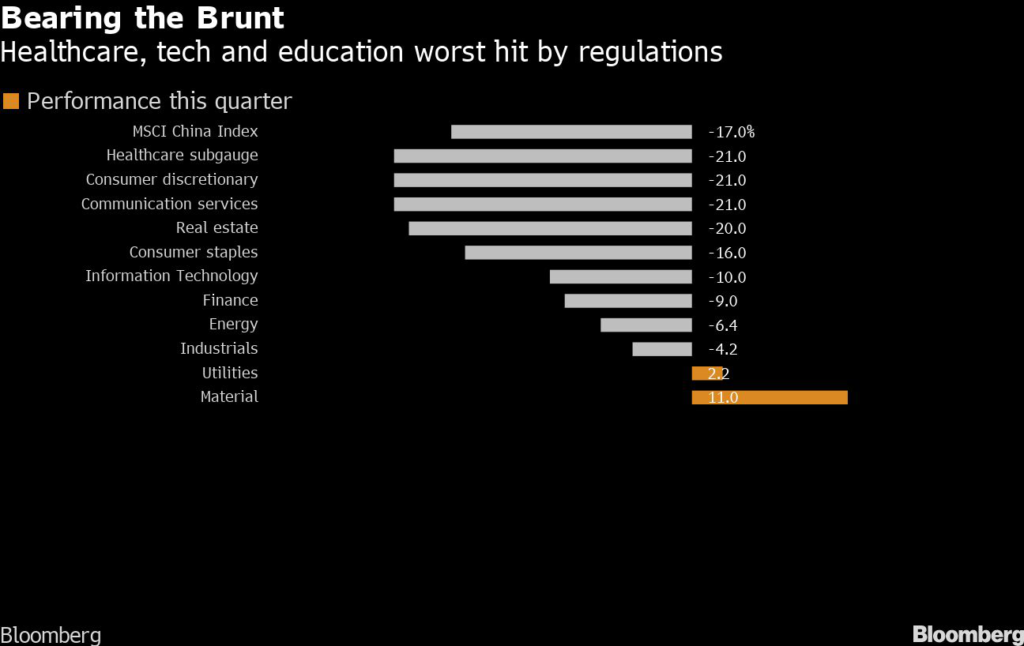(Bloomberg) — Beijing’s agenda to curb the rampant expansion of some private enterprises has sent stocks plunging in sectors ranging from gaming to after-school tutoring and health care to liquor.
Behind the crackdown is the Communist Party’s drive to narrow China’s wealth gap and keep in check the expansion of capital, as reflected in President Xi Jinping’s increasingly vocal call for “common prosperity.”
Meanwhile, industries seen crucial for promoting the country’s ambition to be a self-reliant manufacturing superpower and achieving carbon-neutral goals, such as semiconductors and renewable energy, are taking on a new shine for investors.
Here are some charts showing how the regulatory shock has played out for various industries:
Losing Favor
Since July, China has published draft rules banning unfair online competition and vowed to better protect the rights of gig-economy workers, while state-run media have ratcheted up rhetoric regarding tighter oversight of online drug sales. The barrage of new regulations has especially squeezed the MSCI China Index subgauges for communications services, consumer discretionary and health care, with each plummeting 21% since June 30.
Internet bellwether Tencent Holdings Ltd. is set for its worst quarter in a decade, with a 19% loss. Regulators in July ordered the company to give up exclusive music rights and rejected a merger of two game-streaming firms it has stakes in. Sentiment took another blow this month after state media blasted digital games as “spiritual opium” and urged “zero tolerance” for “vulgar” content on live-streaming platforms.
The selloffs in e-commerce stocks and private-education firms were even more brutal. Alibaba Group Holding Ltd. has tumbled to record lows in Hong Kong while Meituan has sunk 29%. TAL Education Group is worth just a quarter of what it was a month ago after a plethora of regulations prohibiting tutoring firms from making profits. The move underscores efforts by authorities to eradicate an inequality factor in China’s competitive college-entrance examination.
Shares of pharmaceutical companies and online medical-service providers have also been dumped on fears of narrower profit margins. The health-care sector is believed to be a target of the Communist Party for squeezing livelihoods, widening the wealth-and-services gap and deterring people from starting families.
“We believe uncertainty will remain high across the internet and other related sectors,” said Vincent Mortier, deputy group chief investment officer at Amundi SA. “Education and health care are the other two sectors exposed to regulatory risks, and in particular the latter.”
Bright Spots
Investors have piled into industries seen benefiting from China’s determination to meet its green goals and maintain its edge in electric vehicles, pushing the materials subgauge up by 11% quarter to date. Battery makers such as Ganfeng Lithium Co. have soared, while large steel mills have rallied partly because product prices have risen after the government imposed output curbs to reduce emissions.
The utilities subgauge was propelled by power-generation firms, whose prospects are buoyed by a shift to cleaner energy and their participation in the nation’s nascent carbon-trading market.
Banks and industrials are probably “the safest” in the short term, said Louis Lau, director of investments at Brandes Investment Partners. But “if I’m looking to double or triple my money in the next five years, it’ll probably have to come back to the areas of greatest pressure,” he said.
Hardcore Innovation
While Hong Kong’s Hang Seng Tech Index, with a heavy concentration of Chinese consumer-internet stocks, has plunged 25% so far this year, Shanghai’s Star 50 Index, which is loaded with semiconductor, renewable-energy and high-end manufacturing companies, has risen 7.5%.
The disparity shows just how hardware tech — or innovation in chips, EV and high-end manufacturing — is now favored by investors over software tech, which is seen as more geared toward marketing and fund-raising. As such, Shanghai Bright Power Semiconductor Co. has surged 162% this year, while Trina Solar Co. has jumped about 130%.
“We are focusing on strategic sectors where government policy is a clear tail wind rather than a headwind,” said Mortier of Amundi. “China’s transition to a green economy has immense implications and opportunities for investors. This is one of the reasons why we are constructive on the green economy and the new advanced materials industry.”
(Adds a tout)
More stories like this are available on bloomberg.com
©2021 Bloomberg L.P.











